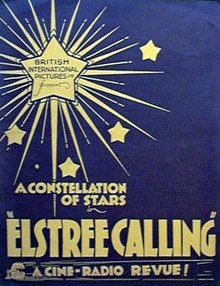Elstree Calling
| Elstree Calling | |
|---|---|
 |
|
| Directed by |
Alfred Hitchcock Andre Charlot Jack Hulbert Paul Murray |
| Written by |
Adrian Brunel Walter C. Mycroft Val Valentine |
| Starring |
Teddy Brown Helen Burnell Donald Calthrop |
| Cinematography | Claude Friese-Greene |
| Distributed by | British International Pictures (UK) |
|
Release date
|
1930 |
|
Running time
|
86 minutes |
| Country | United Kingdom |
| Language | English |
Elstree Calling is a 1930 British film directed by Andre Charlot, Jack Hulbert, Paul Murray, and Alfred Hitchcock at Elstree Studios.
The film, referred to as "A Cine-Radio Revue" in its original publicity, is a lavish musical film revue and was Britain's answer to the Hollywood revues which had been produced by the major studios in the United States, such as Paramount on Parade (1930) and Hollywood Revue of 1929. The revue has a slim storyline about it being a television broadcast. The film consists of 19 comedy and music vignettes linked by running jokes of an aspiring Shakespearean actor and technical problems with a viewer's TV set.
Hitchcock's contribution was the comic linking segments about a man trying to "tune in" the revue on his television set, but always failing to get the picture for long because of his needless tinkering. (In the UK, John Logie Baird's work in mechanical television in the 1920s made television a topical subject at the time.)
Imitating the lavish use of Technicolor by Hollywood studios at that time, two sequences in the film were artificially coloured by the Pathécolor process, which used stencils to tint selected areas of the black-and-white prints.
In their book Film's musical moment, Ian Conrich and Estella Tincknell write:
...
Wikipedia
